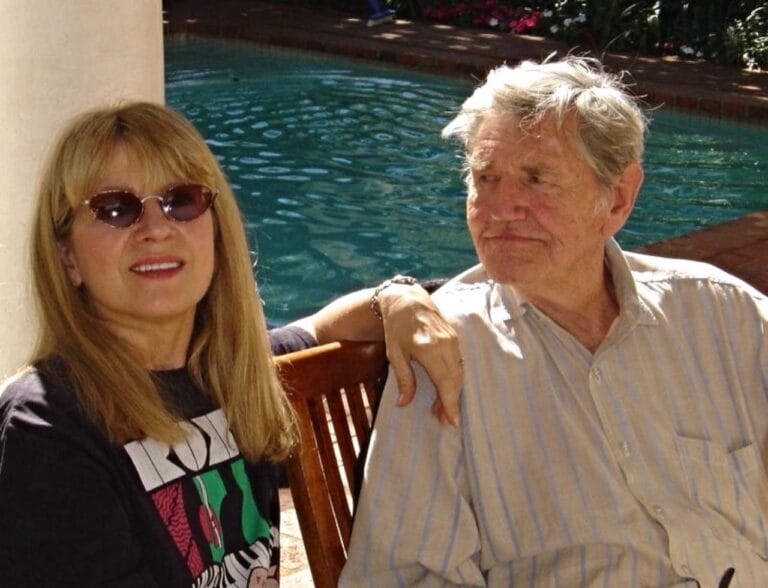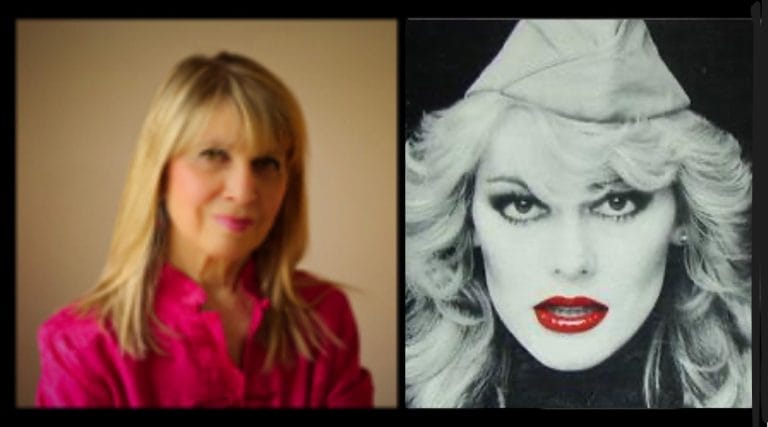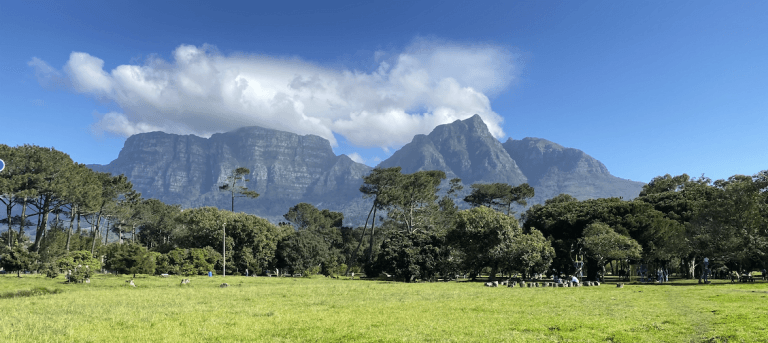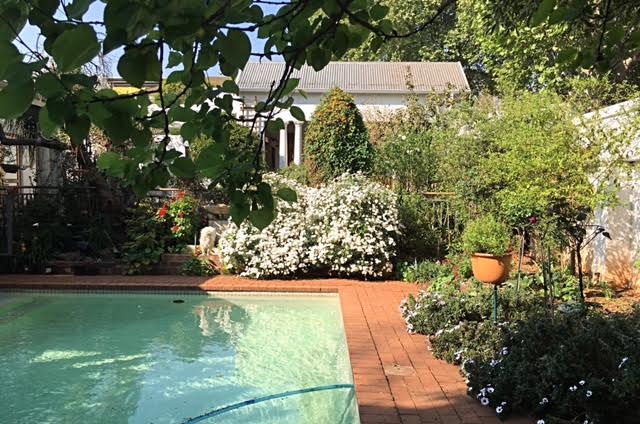Melville News 2009 is a free newsletter aimed at fostering goodwill among residents, merchants and visitors to Melville
Letter from the Editor
I love this time of year in Johannesburg.
After two weeks in France where we saturated our senses with sun, scenery, sublime food and wine, we returned to what felt like more. The scents of spring and an explosion of sky-high sweet peas, jasmine, yesterday, today and tomorrow, tulips and poppies were very welcoming. Earlier this year, we had removed most of the large pots which had occupied prime space behind our kitchen for 10 years and created a combination vegetable, herb and flower garden directly in the ground. And what a success it has been. For anyone starting out, remember Melville News writer Jane Griffiths’ fabulous book Jane’s Delicious Garden, which will inspire you. Jane, who has contributed to the newsletter since inception is abroad right now and will resume duty in the next issue.
Talking books, while in Provence I discovered the first of a trilogy by British actress Carol Drinkwater, which revolves around the acquisition of an olive farm in the vicinity. I was so enchanted that on my return I immediately ordered the three books from Loot and relished every word of what it took her and partner Michel to establish themselves as olive oil producers. For anyone who loves that area of France or who has dreamed of starting a new life near the coast, the trilogy is irresistible.
We are of course spoilt for choice when it comes to bookshops in Melville with several second-hand stores, Boekehuis and the new Love Books in Bamboo which is small and friendly and has some unusual titles that I have not noticed elsewhere, among them The Barefoot Architect – A Handbook for Green Building by Johan van Lengen. For those who find 700+ pages a bit daunting, read below about an eco-house that borders on Melville. I was captivated by many of the earth-friendly features to which the Davie family has committed and sometime I hope to follow at least part of their example.
I was similarly delighted that Melville is among the suburbs in the Waterval region selected to take part in Pikitup’s pilot project “to determine the best methods of separating waste at source, disposal and recycling”. The flyer promised it would kick off in September but so far no-one I know has received the new bins and nor have I had a response to my phone call and email to Pikitup. With a bit of luck this information will be forthcoming by next issue which will also include input from Greenpeace, the international conservation organisation that chose Melville for its headquarters in South Africa.
In the glorious weather which only Johannesburg can offer, I’m sure everyone is feeling upbeat and ready to enjoy the cordial aspects of our amiable suburb.
Happy summer.
![]()
IN THIS ISSUE
- Know your neighbour: Wendy Carstens – Lynne Maree
- A green house on our doorstep – Dillon Davie
- Making the most of 2010 – Andy Rice
- Profile: photographer Emil Wessels – Suzanne Brenner
- Snapshot: Sally Thompson – David Molelekoa
- Letters
- Smalls
- Credits and contact details
KNOW YOUR NEIGHBOUR
Wendy Carstens has quietly been going about the business of Melville Koppies for more than a decade. Lynne Maree lifts the lid on this remarkable woman who was last year officially acknowledged as a local hero.
Most mornings rain or shine you will see an old blue Mercedes Benz parked somewhere in the proximity of the Melville Koppies.
That means Wendy Carstens (right) and her team are in the area: weeding, cleaning litter, building erosion bars, rehabilitating areas – keeping the Koppies the place of beauty we all enjoy so much.
When this English and history teacher moved with husband David to Melville from Benoni in 1996 it was to be close to her granddaughter. Little did she know that her casual visit to the Melville Mardi Gras that same year would be so life-changing. There she picked up a pamphlet about the Koppies and intrigued by what she read, she went on a guided tour of the reserve. From that moment was hooked.
At that time, twice a week, a work party consisting of Richard Hall and JCP worker David Mpilo would work on MK Central, to maintain it. Wendy joined them. She also joined a volunteer work party, led by Norman Baines, which worked on the Koppies on the last weekend of every month.
A self-confessed endurance junkie (Comrades, Iron Man, Midmar Mile), she took to the work like a duck to water. Over the years she became increasingly involved, attending veld management courses and experiencing the best kind of hands-on learning under the guidance of Richard Hall and Norman Baines.
Since 1993 the Koppie has been managed by a small annually elected volunteer community committee in a joint venture relationship with Johannesburg Parks, now City Parks, but with no council funding.
Donations from the private sector, visitors and corporate funding help fund maintenance and other costs to keep the Koppies looking pristine. City Parks maintains structures like the fences.
Last year Wendy read about Nedbank’s challenge to communities to identify local heroes. She entered the competition and promptly won R10, 000 to spend on her beloved Koppies.
But the teacher in Wendy remains. She has initiated field trips for pre-schoolers and continues the 50-year-old tradition of hosting visits from schools, universities and special interest groups. A team of dedicated guides assists on open days and with school visits. Thanks to this dynamic team the story of the Melville Koppies is kept alive.
For other news on the Koppies go to www.mk.org.za/mknews.htm
A full calendar for open days and a map of the Koppies showing the entry points is available at www.mk.org.za/mkcal.htm
LIVING GREEN
A house in Richmond is part of an international trend towards green architecture which aims to use less energy, produce less carbon dioxide and cost owners less money. Dillon Davie shares the experience.
 My father Kevin bought the house when it was a half-completed shell vandalised and stripped by vagrants, and, inspired by international trends, set about a year-long process to convert a dilapidated mess into a modern, comfortable home which costs much less to run than a typical Melville house of the same size.
My father Kevin bought the house when it was a half-completed shell vandalised and stripped by vagrants, and, inspired by international trends, set about a year-long process to convert a dilapidated mess into a modern, comfortable home which costs much less to run than a typical Melville house of the same size.
Water
The house has two systems for recycling water, a grey water system which collects water used in the showers and basins, and a large tank which stores rainwater off the roof of the house. Both of these systems channel water into the garden, and save fresh water from being used to water plants. In addition, the toilets are dual flush models and the shower heads are low-flow, both saving water.
Power
The house is lit by Compact Fluorescent Lights (CFLs), which draw significantly less electricity than traditional incandescent bulbs. In addition, the house does not have an electric geyser or a pool. Geysers and pool pumps are probably the biggest users of electricity in Joburg’s suburban homes. Instead the house uses a gas geyser, which draws municipal gas to heat water. The gas is also used to run heaters in the winter. These features, plus a habit of turning off appliances when not in use, lead to significantly reduced electricity bills in a country where power costs are rising.
Heating
The house is heated by a wood burning fireplace in its centre, with a gas heater in support. In addition, the house was built with a series of water-filled plastic pipes embedded in its concrete floor, designed as an under floor heating system. Kevin is still trying to find the best method to warm the water. One possibility is to install solar panels which would both supplement the gas geyser and supply heat to warm the water in the under floor pipes. In addition, he’s considering installing a system which will cycle warm air from the top of the house through a fan into the basement, ensuring that more of the house’s warmth is retained within the building.
Impact
Any aspiring designer of an eco-house must take into account the environmental impact of not just the house when it’s up and running, but also the impact of its construction. The Richmond house aimed to minimise its construction impact by using more environmentally friendly products and by using recycled materials. Environmentally sensitive paint  covers a wooden floor and has been used on the walls, while window frames, bricks and rubble from the original site were re-used, rather then being trucked off to a landfill. Old wooden parquet floor tiles were recycled from another house into an attractive kitchen floor, finished off with floor wax, rather than harsher polyurethane finishing.
covers a wooden floor and has been used on the walls, while window frames, bricks and rubble from the original site were re-used, rather then being trucked off to a landfill. Old wooden parquet floor tiles were recycled from another house into an attractive kitchen floor, finished off with floor wax, rather than harsher polyurethane finishing.
The Richmond eco house has provided a model for other green buildings in Joburg, but it must also be seen as a testing ground, an experimental lab where new approaches and technologies are being tried out and will continue to be road-tested.
MAKE NEXT YEAR COUNT
Leading brand architect and consultant Andy Rice says Melville’s small businesses and imaginative self-starters could capitalise on 2010 to be in the winning team.Well, maybe not in the actual Bafana Bafana squad, but there is still plenty of opportunity to score a victory or two off the field.
 It is widely accepted that the key to unlocking South Africa’s sustained economic progress is to create conditions for small business entrepreneurship to flourish. And no-one can argue against the fact that the next 12 months or so will be a period of exceptional new business potential, the likes of which South Africa hasn’t seen for many a moon.
It is widely accepted that the key to unlocking South Africa’s sustained economic progress is to create conditions for small business entrepreneurship to flourish. And no-one can argue against the fact that the next 12 months or so will be a period of exceptional new business potential, the likes of which South Africa hasn’t seen for many a moon.
Infrastructure development, a huge increase in inbound foreign tourists, massive international media coverage of what the country has to offer… if we can’t make hay while the 2010 sun shines, we never will.
So anyone with a flicker of enterprise in his or her soul is wondering how to take commercial advantage of this once-off opportunity. The trouble is that not enough people will look before they leap, and all the more obvious business categories will quickly become overcrowded (and unprofitable), when a little more patience and homework might have uncovered richer pickings that needn’t be shared among so many.
There’s no foolproof formula for a business start up, but asking yourself a few critical questions can improve the odds in your favour. So try these for openers:
Am I looking for a short term fling, or a long term career change? There’s nothing wrong with the former, and there will be plenty of clever ideas that will exploit the two or three month window when South Africa is in the spotlight, and then shut up shop with some well deserved cash in the bank. But if you’re planning to use that same brief window to kick-start a sustainable new business, you’d better be confident that it can survive despite and not purely because of the boost that 2010 will bring.
Is my business idea aimed directly at those who will be coming to South Africa, or is there an opportunity to generate business “behind the scenes”, for example by acting as a service provider to those in the hospitality front line? There are already guest houses and transport services, but perhaps not so many are considering the equally important provision of essential services to these enterprises.
Is my business idea truly differentiated from competitors, or is it simply a “me-too” concept? You don’t have to reinvent an entire category, but you should always try to find a clear point of difference from those around you. And don’t be tempted simply to fall back on cheaper prices. Not only will you be sacrificing profit margin, but you’ll also be overlooking the fact that customers are good at recognising real value, and will always be prepared to pay a fair price for it.
However you choose to answer these and other questions, make sure that with any business idea you pursue, you play to your own personal strengths, whether it be in managing people, using technology, or demonstrating creative marketing flair. It’s always surprising how many people end up in businesses that are simply not suited to their own personal style. Haven’t we all at some point experienced the inhospitable hotelier, the Basil Fawlty of South Africa? I know I have.
Listen to Andy’s ad feature on Jenny Crwys-Williams’ show on Talk Radio 702 each Wednesday or go to his Facebook Ad Feature with Andy Rice at www.facebook.com
EYE FOR DETAIL
Coinciding with renewed global interest in photography as art, Emil Wessels talked to Suzanne Brenner about his unflagging love of the camera.
 Photographer Emil Wessels has lived in the vicinity of Melville since he moved to Johannesburg from Stilfontein almost three decades ago. He now resides in Westdene.
Photographer Emil Wessels has lived in the vicinity of Melville since he moved to Johannesburg from Stilfontein almost three decades ago. He now resides in Westdene.
I’ve known him since we worked for (different) print publications and when we were employed by the SABC. As well an expert eye, his enthusiasm and patience linger in my memory.
“Ninety-five percent of journalism involves people,” he says, tellingly stating his belief that there is no distinction between writer and photographer. Both have a responsibility to interpret truthfully and honestly.
His talent came to the fore as an aerial photographer in the air force when he did his compulsory military service. He later worked at Transvaler and Beeld ahead of assuming the position of chief (stills) photographer at the SABC where he remained for 15 years. Among his unforgettable recollections, a highlight was the 14 months he spent on the set of Shaka Zulu in Eshowe, where he formed close bonds with cast and crew. “My daughter Christine was born at that time and (lead actor) Henry Cele named her Thandi, which is her middle name.”
The sum of all his photographic periods continues to colour Emil’s expertise as a photographer. He paraphrases the words of John van Zyl, former professor of film and television studies at University of the Witwatersrand, who said that when one looks at a photograph, one applies one’s “life text”. “How you look at a photo tells me a lot about you,” he explains.
No-one could accuse Emil of being the silent type and words are among the tools he uses to coax the best out of his subjects. It comes as no surprise to me that he is passionate about history which is one of the ways he motivates his students at the University of Johannesburg, where he is a guest lecturer in photo journalism.
 His long-held love affair with Egypt – where his most recent e xcursion was leading a photographic tour – is another exclamation mark in his work. (The photograph on the right is a study of the wife and child of his Bedouin guide.)
His long-held love affair with Egypt – where his most recent e xcursion was leading a photographic tour – is another exclamation mark in his work. (The photograph on the right is a study of the wife and child of his Bedouin guide.)
While Emil’s apprenticeship and subsequent career were largely in the era of dark room photography, he bears no grudge against progress in the digital age which he recognises makes this a more accessible and affordable hobby – though he is critical of the fact that professionals are sometimes displaced by eager amateurs.
His old-school work ethic ensures Emil has crossed the barriers of age and era and he continues to be inspired and to inspire. As a youngster, Gordon Riddick was his mentor and Emil values the visual history that he can pass on to his students. “I can teach people to look at things differently,” he says simply, “and I also learn from them.”
Emil Wessels is available for commissions or photographic workshops at his studio in Linden. He can be contacted on 082 882 4953.
SNAPSHOT: SALLY THOMPSON
The Thompson Gallery has been synonymous with Melville for years. Melville News internDavid Molelekoa compiled this snapshot.

- Sally’s love of art was inspired by her mother, who owned a gallery in London.
- Over the years she has exhibited an eclectic mix of artists and crafts people from emerging to established artists including painters, sculptors, photographers and jewellers.
- She says craft can be art.
- She looks for passion and professionalism when selecting her exhibitors.
- She says South African artists are excelling in the global art world as evidenced by their work in art galleries and museums around the world.
- Reluctant to name her favourites, she concedes that Pat Mautloa and Melville resident Penny Siopis are among them.
Visit The Thompson Gallery at 78 Third Avenue. Phone: 011 482 2039
LETTER
 Thanks for your smalls recommendation of Richard Shabangu (photographed right). He duly came with his team on a public holiday and what a clean-up! They were fantastic and you should have seen the enormous bags of garden refuse they removed. – Rosemary Bosman
Thanks for your smalls recommendation of Richard Shabangu (photographed right). He duly came with his team on a public holiday and what a clean-up! They were fantastic and you should have seen the enormous bags of garden refuse they removed. – Rosemary Bosman
SMALLS
MORNINGS ONLY CRECHE or play group in Melville wanted for a 2-year-old from January 2010. Phone Chrissie on 082 940 0414.
GORDON MULHOLLAND is contemplating a return to Johannesburg, vicinity Melville. If you have a self-contained cottage for him and his Maltese poodle, call 072 841 3906.
GARDEN clean-up for summer. Phone Richard Shabangu on 073 281 8016 or 084 622 4758. Ref: Suzanne Brenner
FREELANCE ADSALES REP sought. Contact Suzanne on 011 482 1072.
STORIES WANTED for Melville News. Email Suzanne on prowrite@mweb.co.za
Send your smalls to prowrite@mweb.co.za
Please include your name and a contact detail for reference purposes and ensure your copy is no more than 20 words.
PROWRITE WRITING SERVICES for all your outsourced writing needs. Contact Suzanne on 011 482 1072 or email prowrite@mweb.co.za
Melville News Free Subscription – see right hand column.
Melville News Team – see below right.
Melville News is an independent newsletter wholly owned and distributed by Suzanne Brenner.
© Unless otherwise stated, all content is the copyright of PROWRITE WRITING SERVICES CC.





